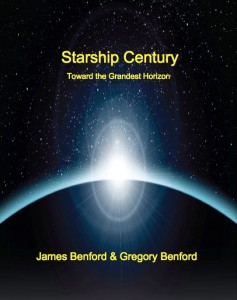 This is not going to be one of my usual reviews. Don’t worry, you will still get to know something about this book, but to differentiate myself from the numerous reviews you have already seen on Starship Century, edited by James Benford and Gregory Benford, I am going to spend some time speculating on a possible scenario I hope you all will enjoy.
This is not going to be one of my usual reviews. Don’t worry, you will still get to know something about this book, but to differentiate myself from the numerous reviews you have already seen on Starship Century, edited by James Benford and Gregory Benford, I am going to spend some time speculating on a possible scenario I hope you all will enjoy.
For those who don’t know Starship Century is a collection of essays and short stories discussing how humanity might realistically achieve interstellar travel. Submissions range from the reasoning why we need to go to space, to the type of propulsion we will use and even how to keep humans alive (and sane) in a metal can for centuries. Truthfully, I was concerned at first when I started reading Starship Century. The cover art did not impress me (as you can see) and with all of the big names attached to this anthology (from Stephen Hawking to Neal Stephenson) you would think they could splurge on a copy editor to fix the numerous spelling and grammar errors.
Nevertheless, I really enjoyed this anthology and found it difficult to put down. The combination of essays and fiction helped better explain the concepts the scientists were trying to get across and trust me when you start seeing equations on the page it is refreshing to read a good story that can put things into perspective. The concept art included in the book was inspiring and I learned a lot of cool tidbits about space, such as why we might need to get fat before going into suspended animation, whether the first colonists will even still be considered human and even the potential socio-political scenarios that could lead to interstellar travel. I didn’t exactly buy the idea of bored trillionaires paving the way to deep space. There are good arguments against that theory, as recently stated by Ian Sales, author of “Adrift on the Sea of Rains” and “The Eye with Which the Universe Beholds Itself“, during an interview I did with him on my blog. That aside, if you are writing a hard science fiction story, this anthology is an excellent and entertaining reference for your work.
The problem with a lot of the scenarios postulated in Starship Century, however, is that most will take a century at least before we see the first mission into interstellar space. At the rate we are going, with spending cuts and a general distrust of science, we will be lucky to see a man on Mars in our lifetime much less a cargo of frozen colonists off to settle Terra Nova. Some have hope for private space flight (see above for those skeptical) or China kicking off a new Space Race, but I am not holding my breath. Still, with all of the history of space exploration found in this anthology, someone with a mind for mucking about with the past has a lot of fertile ground in which to plant the seeds of Alternia…
The authors of Starship Century seem to be in agreement that the 1970s was a bad time for space exploration. President Nixon gets a lot of blame for curtailing the space program by cancelling the rest of Apollo (and thus subsequently ending any interest in nuclear propulsion) and approving the Space Shuttle program. Despite popular opinion, the authors of Starship Century considered the Shuttle an ineffective vehicle for transporting human or cargo and creating national tragedies with the destruction of Challenger and Columbia when instead civilians should have accepted the dangers of space travel long ago. So if we are going to change the past, we need to do it before the 1970s.
Stephen Baxter, who did contribute a story to Starship Century, authored the novel Voyage where John F. Kennedy survives his assassination long enough to see the Moon landing. Later, Kennedy convinced Nixon to direct NASA’s efforts toward Mars. At the very least, this story represents the fact that we need to get rid of Nixon, or at least the historical forces he represents, out of the picture. We need America to not cancel Apollo or research into nuclear propulsion. Perhaps we also need to avoid detente. More tensions between the western and communist blocs, perhaps even the use of a nuclear weapon in anger, might put the fear of annihilation so deeply into the human psyche that the need to save humanity is so great that we must do everything in our power to get off this rock.
The space program might become more militarized as millions are poured into research to secure the “high ground”. The Shuttles are never constructed, instead separate vehicles are used to transport human and cargo (although reusable spacecraft are probably not entirely gone from this timeline). The first humans arrive on Mars riding a nuclear engine, while Americans and Soviets (eventually organized under a New Union type treaty) compete to construct the most space stations and manned lunar bases. They are not alone either. By 2013 the world is more multi-polar as other nations catch up with the superpowers. The Commonwealth, Europe, China, India, Brazil, South Africa (who probably would keep their nuclear weapons in this universe) and a handful of other nations have functioning space programs.
Chemical rockets are going out of fashion and there is serious research in solar sails for planned missions to the outer planets. There are even private space programs now (lessons learned by the big national organizations have filtered down in the private sphere, just as it did in our timeline with the Space Race) providing relatively cheaper space travel than we have here in our universe along with plans for asteroid mining and orbital manufacturing. More civilians are finding rides into space with these corporations (they accept the dangers our space travel because they believe the benefits outweigh the potential harm), but the best route to take to space remains either the military or higher education, which thanks to the demands imposed by the continuing Space Race, America is no longer falling behind in the sciences. Global warming is still a fear, and in fact might be worsen in this timeline, but most are now confident to eventual shift to a space-based economy will alleviate the pressure on Earth’s environment.
Of course, the above is just one of many scenarios and I probably could have done more serious research when crafting it, but it accomplishes its true goal by proving that even with the best case scenario getting out of our Solar system is going to be insanely difficult. We have a long road ahead of us, but the benefits we can reap as a species is tremendous. Hopefully Starship Century can inspire the next generation of dreamers, both in the literary and scientific worlds, to build the future we all want to see.










